Social Media on SEO
Social Media on SEO are optimistic about driving more website traffic to businesses. In fact, with as many as 68% people using the internet and 5.23 billion on social media, using the digital ecosystem for marketing has to be a primary business focus.
Effects of Social Media on SEO
Marketers shouldn’t underestimate the 50% of people (almost 2 hours per day) who use social media via mobile. In addition to following brands, celebrities, and news on their favorite platforms, consumers are adding rich content across Facebook, Instagram, Twitter, and other social media platforms. Every conversation or post creates something new.
The good news for digital marketing teams is that while follows, likes, and shares do not correlate directly with search engine optimization (SEO), good-quality content does. For example, pushing out content on social media that people want to engage with and explore improves their chances of making it to your website. This assists off-page SEO, better domain authority, backlinks, and generating followers. Suddenly, you have attributes that will improve your ranking.
This post will examine how social media correlates with SEO and how brands can succeed effectively.
Social Media, Traffic, and SEO
Social media helps improve your brand visibility, supporting the SEO efforts that drive traffic to your website. The more channels you are visible on, the greater the potential to get traffic and revenue with online marketing.
If you have a conversion rate of 10% and 200 people visit your site, you get 20 sales at face value. If you have 500 visits, you are going to get 50 deals. It may not be that straightforward, but the point here is that traffic equates to revenue.
Request a Quote :
The Overlap Between Social Media and SEO
At first glance, social media and SEO might seem like apples and oranges. Social media platforms cater to short-term audience interaction, while SEO focuses on long-term search visibility. However, both work toward the same overarching goal: increasing your online reach.
When your social media campaigns promote engaging content, they indirectly contribute to your SEO goals. More shares, comments, and links to your website increase your online authority and visibility, which can improve your rankings over time. SEO, in turn, keeps your content discoverable long after your social campaigns have ended. Together, they create a virtuous cycle of growth.
Broader Reach:
A strong presence on social media means more people find and click your web content, signaling search engines about its relevance.
Customer Trust:
Cost-Effectiveness:
Combining these forces is more than a good idea; it’s an essential strategy for digital success.
Understanding Social Signals: How Social Media Impacts Search Rankings
While Google has clarified that social signals (likes, shares, and comments) are not direct ranking factors, they do play an indirect role. When your content gains traction on social platforms, it earns exposure, traffic, and indirectly, backlinks.
Content Visibility:
Brand Mentions:
Traffic Boost:
Takeaway? Every like, share, or tweet has the potential to improve your website’s visibility on search engines.
Optimizing Social Media Profiles for SEO: Best Practices
Your social profiles are often your audience’s first point of contact. Optimizing them for SEO ensures you’re making a strong first impression while remaining searchable online.
Steps to Optimize Your Social Media Profiles
- Keep Names Consistent: Use the same business name across all platforms to ensure searchability and reinforce brand identity.
- Write an Optimized Bio: Incorporate primary keywords in your profile description naturally. For instance, a café might use “locally-roasted coffee in [City Name]” for local SEO.
- Link to Your Website: Add your website link to drive quality traffic and improve trust signals for your domain.
- Use Alt Text and Hashtags: For visual platforms like Instagram, descriptive alt text for images and relevant hashtags improve post discoverability.
By aligning your social profiles with SEO guidelines, you’re ensuring your company appears in relevant searches across multiple platforms.
Content Strategy: Aligning Social Content with SEO Goals
Your content marketing strategy should bridge the gap between SEO and social media. By aligning your blogs, videos, and social posts with SEO keywords and topics, you create a consistent online presence.
Tips for a Unified Content Strategy
- Promote Evergreen Content: Share high-value, evergreen blog posts on social platforms to keep traffic flowing long-term.
- Focus on Keywords: Use SEO keyword research to determine trending topics for both search engines and social discussions.
- Call-to-Action (CTA): Entice your audience to visit your website, download a resource, or sign up for a newsletter. CTAs drive measurable actions that benefit both SEO and lead generation.
- Repurpose Content: A successful blog post can become a carousel on Instagram, a TikTok explainer video, or a Twitter thread.
Social content that dovetails with your SEO goals ensures you’re targeting the same audience on multiple channels for maximum engagement.
Link Building: Leveraging Social Media for High-Quality Backlinks
High-quality backlinks remain one of the most influential ranking factors for SEO. Social media is one of the best platforms for getting your content in front of the people who can link back to it, like bloggers or journalists.
How to Use Social Media for Link Building
- Share Link-Worthy Content: Publish original articles, guides, or infographics that earn shares.
- Engage Influencers: Build relationships with thought leaders in your industry, increasing the likelihood of backlinks from their websites or mentions.
- Encourage Content Sharing: Use hashtags and tag relevant profiles to increase the chances your content will be shared widely.
Strategically using social media to create buzz around your content can result in natural backlinks that boost your SEO rankings.
Measuring Success: Tracking Social Media and SEO Performance
To ensure your efforts are translating into results, you’ll need to track the right metrics for both social media and SEO.
Metrics to Monitor
- Social Media Metrics: Engagement rate, shares, click-through rate (CTR).
- SEO Metrics: Organic traffic, domain authority, backlinks, bounce rate.
Tools for Measurement
- Google Analytics: Track traffic and conversions from social media to your site.
- Social Media Insights: Platforms like Facebook, Instagram, and LinkedIn provide built-in analytics for tracking post performance.
- SEO Tools: Tools like SEMrush or Moz allow you to monitor keyword rankings and backlink progress.
Reporting on these combined efforts will help you refine your strategy for even better results.
Future Trends: What’s Next for Social Media and SEO?
Both social media and SEO are rapidly evolving. Here’s what’s on the horizon:
- AI-Driven Content: More brands will use AI tools to generate social and SEO-friendly content.
- Voice Search Integration: Creating conversational content will become essential for voice search optimization.
- Shortform Video Dominance: Social video (Reels, Shorts, TikToks) plays an increasing role in driving traffic and engagement.
Staying ahead of these trends will ensure your brand remains competitive.
Maximizing Your Online Presence Through Integrated Strategies
The relationship between social media and SEO is less about overlap and more about synergy. Together, these strategies amplify your content’s reach, improve customer trust, and drive meaningful results. By implementing the tips above, you’ll create a cohesive marketing strategy that reaps rewards now and in the future.
Want to take your SEO to the next level? Don’t forget to align your efforts with powerful tools like Google Analytics and automated AI platforms to streamline the process. When done right, strategic integration of social media and SEO will set your business apart from the competition.
Whether it’s Instagram, Twitter, or Facebook, more business owners than ever before are taking advantage of social media marketing as a part of their integrated marketing plan.
Boston Web Design
Read How Social Media Can Help Your Website & Business
Social media services can play a big part in generating traffic. The screenshot below shows searching for entrepreneur Elon Musk via Google as a starting point.
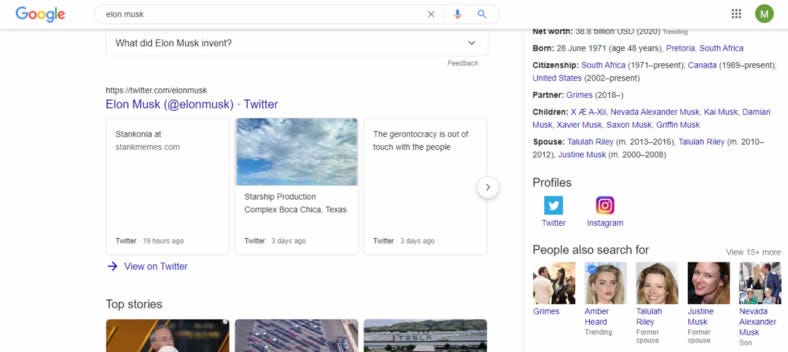
Google is crawling social media for results as Elon Musk’s Twitter feed and Instagram profile are returned with the latest stories against them.
The same logic applies to brands searching for boohoo returning their Twitter feed on the first page of Google search results.
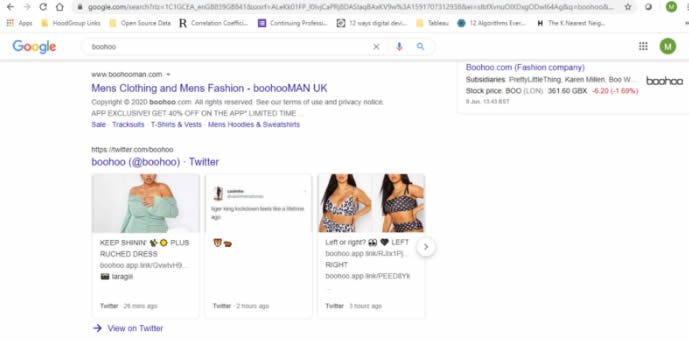
Other brands, such as Simply Cook, have their YouTube videos, LinkedIn profile, and Facebook page, all showing Google rankings.
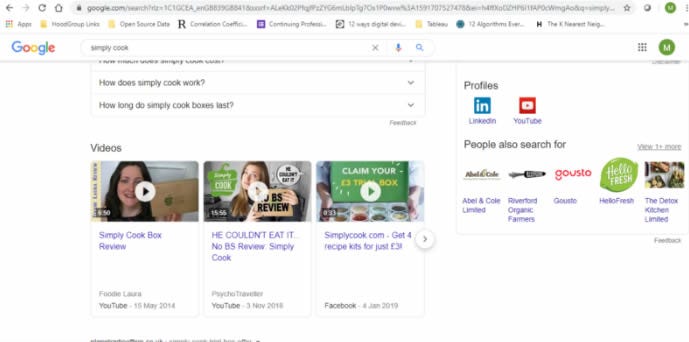
We could probably go on all day with examples, but the fact is that Google scans social media content and ranks it. Therefore, you should treat the content on your pages the same way as your website or blog, as a method of SEO to accumulate traffic.
Social Signals and SEO
A social signal is a human interaction metric gained via platforms like Facebook, Twitter, Instagram, Linked In, and Reddit (as well as countless other social media sites available today). This includes likes, dislikes, comments, shares, and follows, representing affiliation to a brand, whether positive or negative.
As more consumers have joined many social media channels, social signals have become essential to organic search engine rankings. While Google has said that social signals are not a natural part of their ranking algorithm, those websites showing on page one tend to have the highest share volume. The research from Cognitive SEO below shows the link between social interactions and rank.
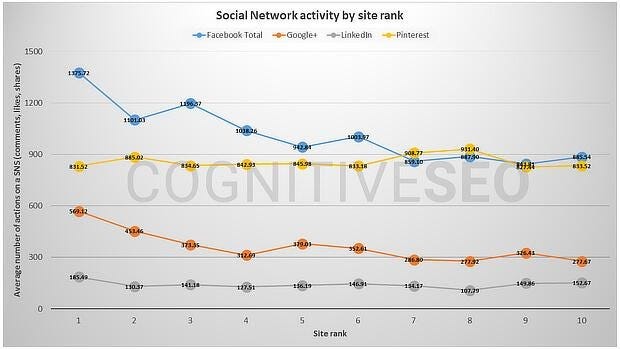
If there is no direct link between then it is fair to assume the following:
- Brands and people with a high volume of social signals are generating more traffic to their pages due to higher visibility
- More content is developed and likely to build backlinks that are very effective for SEO with many social interactions.
On that basis, it is vital to keep social media content relevant and up to date. Readers are interested in quality content, and they will interact with it if that’s what they see.
Social signals create traffic to your site. Consumers see something they like and create links. Even if social signals are not part of a tiny weighting in Google algorithms, the long-term impacts of backlinks and domain authority are vital for SEO.
Some ways that you can ensure you stay at the top of social media feeds include:
- Posting daily or even multiple times per day to keep relevant. The volume should relate to what you feel applies to your brand. Some celebrities might post constantly, but consumers wouldn’t expect that from a construction or engineering company, perhaps.
- Using video and images which are engaging for social media users
- Creating original content without sharing existing articles would improve somebody else’s visibility.
- Vary content between social media platforms. Users expect to see different voices and tones depending on their viewing platform.
The search algorithms of Google, Bing, and other engines are black boxes in that nobody is 100% certain about what helps with ranking. However, with the amount of content generated by social media today and people’s interaction with it, evidence suggests that the platforms create valuable SEO content. While that may come indirectly via backlinks, social signals are essential for digital marketing.
Social Content Reach and SEO
Social media helps your content reach as many people as possible. This includes those who may not have ever realized you exist before appearing on their social media news feed. Strong content will translate into high-quality traffic.
Research conducted by Matthew Woodward showed the value of social media when trying to rank for specific keywords, in this case, “Unhealthiest Foods.” Shortly after, the post got a featured snippet for the keyword search engine rankings (see the screenshot below). In short, the post was shared on social media and got the backing of celebrity George Takei, generating 16,000+ likes and 8,000+ shares.
This follows on from what we believe of the impact social signals have. The high volume of shares and likes creates a following and advocacy for content. With that, organic rankings receive a boost thanks to the quality content.
It is also essential to remember that while the current Google algorithm states it does not consider social signals, that doesn’t necessarily mean it will stay the same. After partnering with Twitter back in 2015, signals were used. Always watch the news to see what the search engine powerhouses consider the most crucial ranking factors.
Social Media and Keywords
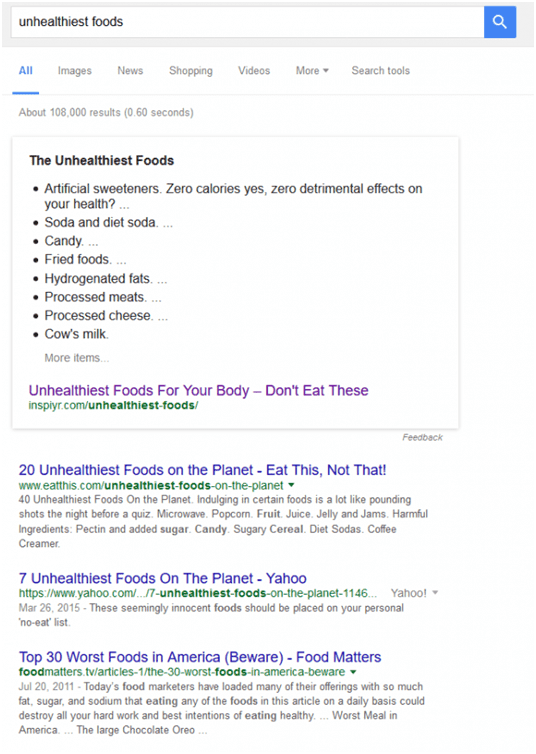
Source: Matthew Woodward
To maximize the effectiveness of social media content, just like traditional SEO, keyword research is vital to attract the right audience. Neil Patel has suggested that social media is “the new SEO” in his article. He means that consumers go straight to Facebook, Instagram, Twitter, or LinkedIn to find what they need and skip the search engine altogether. Therefore, brands and people must optimize their social profiles with content and keywords for business websites.
There isn’t necessarily the best social media platform for SEO, as they all have advantages. The key is thorough research and determining where your target audience consumes social media.
The stats vary depending on where you read them, but Facebook has about 2 billion monthly users. All of these people will be sharing content. With Facebook, you can target user interests at a very granular level. You can think of this in the same way as you would keywords. For example, what type of person is likely interested in your product and service based on their demographics? If you tailor your marketing efforts to those groups, the content will be read, liked, and shared more readily.
Youtube
YouTube isn’t far off Facebook for monthly users as video creates highly engaging content. Videos posted on YouTube certainly have some bearing on ranking, as the most popular ones tend to appear at the top of search engine rankings.
Optimizing your SEO via YouTube is vital to have clear descriptions and tags against all content you add. A key component is harnessing your video text’s power with transcripts, closed captions, and subtitles.
It is important to remember that Google owns YouTube, making it far more likely to crawl the platform within its algorithms. Creating popular content ensures the videos and the text is shared, generating links and optimizing SEO.
Twitter hashtags are used in marketing to generate awareness of brands, people, and content. We have already seen that Tweets appear in Google searches, assuming they still crawl the platform and count towards SEO. A quick search for the US President brings up the most recent Tweets at the top of search results.
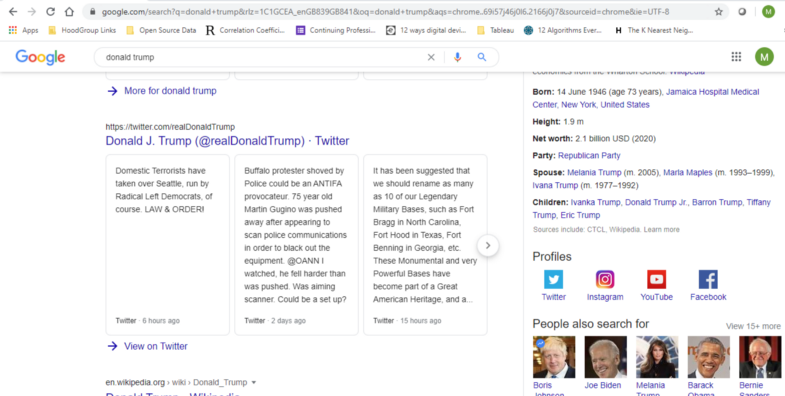
To make the most of this, having a Twitter presence is vital. Following that, just like any other form of SEO, it’s all about the keywords. You will likely have done keyword research for your website or blog, and Twitter content needs to follow the same process. You mustn’t just haphazardly Tweet links that are not relevant. Ensure they relate to quality content and draw engagement from the audience.
Twitter has various analytics tools to help you with keywords and understanding your audience.
Takeaway on Effects of Social Media on SEO
There are many SEO tools, social media tools, and platforms in the digital ecosystem, and the key is finding your audience and focusing your efforts there. In contrast, content marketing on every platform is ideal. You sometimes need to step back and be realistic.
The key to optimizing SEO via social media is quality content. There is evidence that Google uses some social signals in its algorithms, but the best results will be those who engage with your social media posts. Many people can find you on social media, become advocates of your brand or business, and get your content seen. It’s a bit like a modern-day version of a pyramid scheme.
Social media positively affects SEO and is crucial for your digital marketing strategy.
Website Design & SEO - Call (425).336.0069
Off-Page SEO & Web Development for Small Businesses
If you are looking for an On-Page or Off-Page SEO SEO, you’ve come to the right place! We provide inexpensive web services, SEO, and website-building solutions. Our services include social media and interactive web page development and are available but not limited to Auburn, Algona, Milton, Seattle, Bellingham, WA, Des Moines, Bellevue, Issaquah, Burien, Federal Way, Olympia, Fife, WA, Maple Valley, Mill Creek, Covington, WA, Des Moines, and Seatac.
Small Business Off-Page SEO
Seattle Web development includes numerous online services, including SEO, On-Page SEO, and Social Media for Small Businesses. As a result, some local areas we serve include Washington State | Auburn | Bellevue | Eastside – Bellevue | Bellevue Website Design – Local Website Firm | Bothell | Des Moines | Federal Way | Fife | Issaquah | Kent | Kirkland, WA | Lacey | Lakewood | Lynwood | Maple Valley | Mercer Island | Marysville | Mill Creek | Seatac WA | Tacoma | Tukwila | Vancouver | Everett | Spokane | Seatac | Renton | Seatac.
We help small businesses with web page design services in and around Seattle: Belltown | Fremont | Madison Park | Capitol Hill | West Seattle | Queen Anne | Magnolia | Downtown Seattle | and Northgate.
Whether you’re looking for a website for an attorney, small law firm, dentist, or marketing a law firm? Our web developers will deliver what you want. Call Visualwebz today at (425)-336-0069.
Seattle Web Designing & Off-Page SEO Services
Besides helping with Off-Site SEO, we also provide individualized web design, the latest user interface designs, and websites with trending web design elements since 2008. Whether it’s a minimalist website design, a new website for a Seattle organization, a hairdresser, an accountant, or local SEO for a dentist? Check our reviews and call us at (425)-336-0069. We always deliver.
